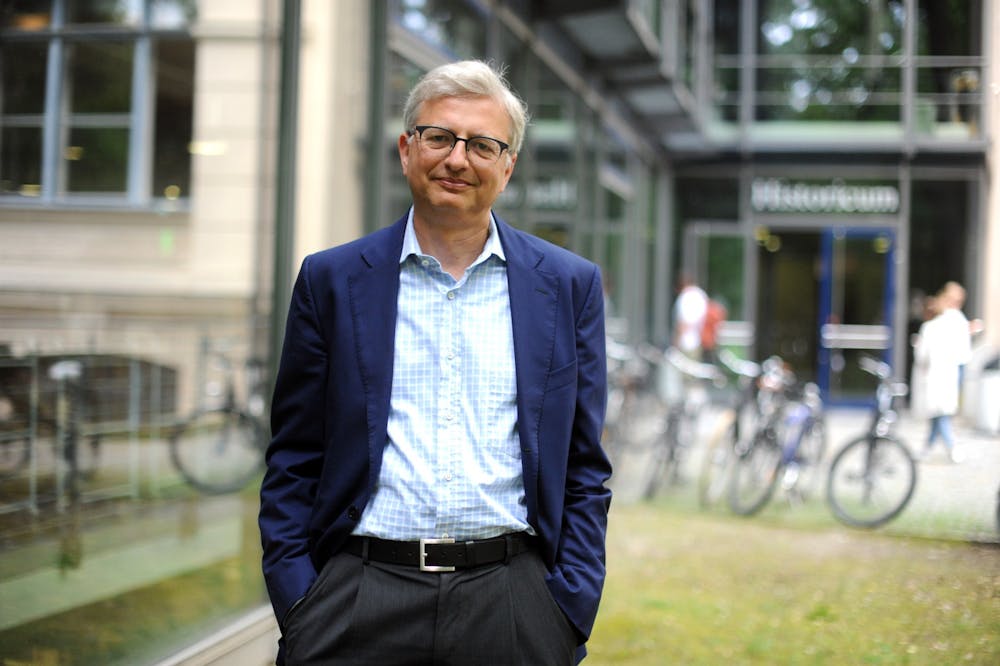This article is an opinion piece that does not necessarily reflect the views of The Eagle staff.
In a recent op-ed published by The Eagle, Yazan Nusiebeh asks, “Why are Palestinian voices neglected in AU, by both the student body and the Center for Israeli Studies?” Before replying to Yazan’s question with respect to the Center, I want to acknowledge that in these difficult times the thoughts and feelings of many in our campus community are with their relatives and friends in Gaza, in Jerusalem, in Tel Aviv, in Ramallah and across the region.
As director of the country’s oldest center for Israel Studies, my most important goal is to offer a broad range of classes and public events that reflect a variety of views and opinions on Israel within the framework of academic discourse. I am proud that our Center for Israel Studies (CIS) has enjoyed excellent cooperation and co-hosted events with many other American University schools and institutions, including Islamic and Middle East Studies, Arab World Studies and the Ibn Khaldun Chair of Islamic Civilization. Our events are attended by a diverse audience and by students of a variety of backgrounds and opinions, as Yazan, whose views at our events I always respected, knows best.
At the CIS we take very seriously the fact that over 20 percent of Israel’s population are Palestinian citizens. I always made sure to include their points of view in our events, just as we have sought to give expression to other groups marginalized in Israeli society. Our last big conference before the pandemic focused on asylum seekers and refugees in Israel, and the first online event during the pandemic year focused on “Being Black in Israel.” In 2018 we featured an entire conference on Israel’s Palestinian or Arab citizens, hosting several Palestinian speakers, both from the region itself and from closer to us, including our own AU faculty. When the controversial Basic Law known as the Nation-State Law — “Israel as the Nation-State of the Jewish People” — was adopted, we co-organized a panel and of course included an Israeli Palestinian voice. CIS has included Palestinian speakers on Israeli cuisine and, when we had a conference on the Israeli diaspora, we included a perspective on the Palestinian diaspora presented by a Palestinian AU faculty member. In our conference on the history of the kibbutz, we featured a Palestinian speaker who explicitly spoke about the disputed issues of the land on which some of the kibbutzim are built, and more recently we hosted a discussion on "Indigenous Peoples' Land: The Case of Bedouin Land” in Israel with two speakers from the Bedouin community. Yazan claims that CIS “ignores the erasure of villages.” That is incorrect. We hosted a lecture, co-sponsored by the Humanities Lab, in 2018, specifically on this topic entitled "When Nature Becomes Ideology: Lifta’s Silence."
At other programs we have included discussions on Israel’s occupied territories and invited speakers from Gaza and the West Bank. We are well aware that while sometimes they accepted our invitations, as for example for a conference on water in the Middle East, at other times invitees have refused to speak under the auspices of the Center for Israel Studies, either because of their opposition to “normalization” with Israel or because they feared threats in their own institutions after returning home. We always respected their decision. It remains to be discussed with all interested parties in which ways a Center for Israel Studies should actually include developments in the West Bank and Gaza within its program other than in a comparative context, without thereby asserting a claim that those areas are part of Israel itself.
What Yazan could not know when writing his article is that at the CIS we have already begun to think of how to expand and redefine the role of Palestinians within our mission. In fact, our first Amy and Alan Meltzer Fellow this summer, professor Morad Elsana, started to work on May 1 on a proposal for a specific Israeli Arab Studies Program within CIS, with the mission of increasing both research and education on Palestinian citizens of Israel. With the recent tragic events in the region, this seems more important today than ever.
CIS has always aimed at developing a program of academic excellence and of dialogue, both inside and outside of our campus. We will continue to do so in the future. Especially in these times of increased violence and hatred, nothing is more important than building bridges. At AU we agree to disagree, and even if we do not always share the same opinion, we try to learn from valid criticism. I hear Yazan’s concern and I am open to starting a discussion of reformulating our mission statement, which indeed has been up for a long time and could use some updating. We all need regularly to reevaluate what we are doing and how we are doing it.
I hope that Yazan’s article will in fact be the beginning of a fruitful dialogue on campus that will give more weight to Palestinian voices while at the same time recognizing Israel’s right to exist. In that sense, let us sit together and work for a better future for both Jews and Arabs, Israelis and Palestinians. We need this especially in these dire times in the Middle East. And while we won’t be able to solve the situation there, we can start by working together here, on our shared campus.





